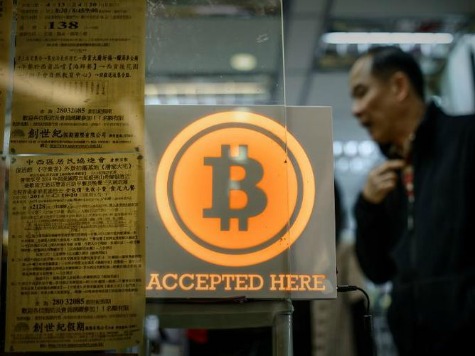
New York Times editorialwriter Joe Nocera had a field day onFebruary 28th raging against “TheBitcoin Blasphemy,” which he claimed is libertarian “sacrilege” since it is “unconnectedto any currency or any government.”
Itis enlightening that the leftist thought police at the Times would admit Bitcoinis an existential threat to their “fullfaith” in the dollar and U.S. government as statist religion. The Bitcoin currency is hyper-competitiveagainst the dollar, because it operates outside of Congress and the FederalReserve’s ability to foster inflation as a scam to pilfer Americans’ wealth. The bankruptcy last month of Mt.Gox as one of the Bitcoin exchanges demonstrated that no currency is exemptfrom criminal theft. But Bitcoin is notgoing away, because the dollar and other paper currencies are designed to aidand abet state-sponsored theft.
Since Congress passed the Federal Reserve Act in 1913, inflationhas destroyedover 96% of the value of the dollar. This has been accomplished throughthe Fed’s policy of fostering excess government debt to devalue the dollar and “negativereal interest rates” to devaluesavings by restricting how much banks pay depositors interest rates thatdo not keeping up with the cost of living. As economist John Maynard Keynes said: “By a continuingprocess of inflation, governments can confiscate, secretly and unobserved, animportant part of the wealth of their citizens.”
Bitcoin is the name of a group ofpeer-to-peer payment networks that serve as an open-source form of crypto-currencyintroduced in 2009 by a software developer with the alias of “SatoshiNakamoto.” Bitcoin was not the firstattempt at creating an electronic currency, but it became the first digitaltender to gain serious interest and backing by designing a structure that cutout all middlemen, such as PayPal and Visa, to determine if one party was stillowned money or had previously spent it. The Bitcoin protocol solved this problem by creatinga publicly viewable global ledger, called “blockchain“, showing thesequential transactions of all accounts using Bitcoins.
Unlike on-line credit cards and PayPal-type systems thatallow buyers to claim their money back, Bitcoin permanently transfersvalue. Since there is a limit of 21million on the total number of Bitcoins ever available, Bitcoins are rareunits of value. There have never beenany problems with the blockchain registration of Bitcoin ownership, and 3,797 merchants currently accept Bitcoinas payment.
The value of Bitcoins appreciated by 6,000% to over $1,000 eachin late 2013, before dropping back to about $557 today. In the interest of full disclosure, Ipersonally passed on the opportunity to purchase 10,000 Bitcoins in 2009 for $2,500;which at one point late last year would have been worth almost $30,000,000.
The value of Bitcoins has been cut in half over the last twomonths due to the collapseand bankruptcy of the Mt. Goxvirtual-currency trading exchange on February 26th. Mt. Gox was founded in 2009 by American software hackerJed McCaleb in Tokyo as a site to trade cards for the game “Magic: The Gathering.”(Mt. Gox is short for “Magic: The Gathering Online Exchange”). “But McCalebturnedthe site into a Bitcoin exchange before the selling it 2011 to Mark Karpeles,” aFrench citizen operating in Philadelphia.
Karpeles evangelistically promoted Bitcoin and claimed to beconducting 20,000 trades a day on the Mt. Gox exchange. After filing bankruptcy, Karpeles admits morethan 744,000 Bitcoins ($475 million) are “missingdue to malleability-related theft.” Afterthe bankruptcy filing stated the company has only $32.75 million in assets and $174million in liabilities, Mt. Gox was sued for fraud and theft. The missing money is especially suspicious sinceall Mt. Gox clients’ were directed by the company to first transfer ownershipof their Bitcoins on the blockchain to Mt. Gox, who subsequently provided “zero-confirmation“of the time and the counter-party for customer trades.
Even after their value was cut in half, the spectacularperformance of Bitcoin has demonstrated to the world that a currency does notneed to be controlled by a government. Thecentral idea behind the concept of currency is ownership. Bitcoins are generally stored in a digitalwallet, and transactions are recorded on the blockchain shared public ledger. Members with powerful computers areencouraged to maintain the transactional register by “verifying the blockchain” — solving complex mathematicalequations and adding another “block”of transactions to the existing chain.
The strength of Bitcoin is that it only charges merchants lessthan .1%, versus the 2-4% transaction fees charged by credit card operators forsupposed fraud protection. But the factthat Bitcoin transactions are not reversible virtually eliminates fraud risk. The bottom line is that merchant credit cardfees are on 20-40 times higher than Bitcoin fees.
The “Bitcoin protocol” isa new technological breakthrough, and it is sparking numerous new applicationsin computer science. Venture capitalistshave been quick to invest money in startup businesses that approach Bitcoinwith unique ideas. One company named Bitcoinx wants to “democratize finance” bycreating “coloredcoins” as crypto-currencies that represent other physical commodity. Colored coins would then act as surrogates totrade anything from stocks, bonds, or any other securities at a fraction ofcurrent transaction costs. There is currentlyan ongoing movement to get the Securities and Exchange Commission to approve anexchange-traded fund for Bitcoins.
Libertarians and liberals both profess personal liberty as thefoundation of their philosophical beliefs.Libertarians consider liberty to be the lawful ownership of propertyand any infringement upon that property, such as government sponsored inflation,is viewed by libertarians as an impediment to liberty. In contrast, liberals believe government must employmany “tools” to redistribute wealth to create greater liberty.
Bitcoin remains libertarians’best friend and liberals’ worst nightmare, because Bitcoin is immune fromgovernment’s tools designed to redistribute wealth through inflation. The bankruptcy of Mt. Gox may give the NewYork Times and their liberal fellow travelers something to celebrate, but Bitcoin remains a “sacrilege” to the Times’ “fullfaith” in the dollar and U.S. government as statist religion. Bitcoin is not going away.
<>The author welcomes feedback @ chriss@chrissstreetandcompany.com
Chriss Street is teaching microeconomic at University of California, Irvinethis spring from March 31 – June 8, 2014. Call Student Services at (949) 824-5414 or visit http://unex.uci.edu/courses toenroll!

COMMENTS
Please let us know if you're having issues with commenting.